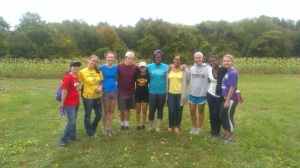
Audience Navigation
Utility Navigation
Student Blogs
Holy Cross Community Garden: The Overview
Today, I want to take the time and go into details about the overall goal of the project and the breakdown of the first few weeks. My research partner, Matt, and I will try to answer three questions:
- Why a garden? – Why should we choose the medium of a garden as a vehicle of expression?
- Why a community garden? – By incorporating the community into this garden project, in what ways does Holy Cross and local organizations benefit?
- What type of garden? – In order to determine what agricultural methods the garden will use, we must decide what crops to plant, what agricultural techniques will be used, and answer other physically and spatially oriented questions.
Let me explain a little further. The first two questions are crucial because our (American) culture is often centered upon that which is convenient and quick. Hence, why should an individual take time out of their busy day to garden if one can drive or walk down the street and buy something?
For the first three weeks, the majority of our time will be spent collecting data and doing literature reviews in order to compile concrete evidence and insight as to why a garden, and more specifically, a community garden is beneficial to the individual, the community, and the environment (I am sure, as we conduct further research other related questions will arise). Once, we have a good grasp of the fundamental questions, we will move on to learning the type of garden we should have and what it takes to actually create one that will succeed in the urban/New England areas.
As for my own personal experience, I wholeheartedly believe that a community garden is needed as it symbolizes something much deeper.
One of the things that inspired me was a class I took as a freshman in college, which was a food philosophy course called, “I am, Therefore I Eat.” The class gave me the tools to start critically thinking about the topic of food, and lead me to volunteer for the Community Harvest Project. This organization is a non-profit, which grows, tend, and produce fresh vegetables and fruits in order to assist with the alarming hunger issues in Worcester County. I first learned about the non-profit organization through interning at the Community-Based Learning department at my school. The department’s mission is to encourage students to take the theories they learn in class and try to critically apply them with hands-on experience. I did just that. It should be noted that when I did volunteer for the Community Harvest Project, I was a junior; yet, the knowledge I have gained from the class as a freshman resonated within me. The different ideas, theories, and discussions from a few semesters ago came back to me.
My time at Community Harvest Project showed me that farming is similar to a form of art—it is intricate in many ways. The method you use must be executed accordingly, or else your crops will fail. The way you act on it requires a delicate hand, as well as pride for your work. It is exhausting and sometimes redundant that you almost want to give up, similar to a painter who can’t seem to get that one aspect of his work the way he likes it. Moreover, it requires knowledge about your surroundings because you might just stumble upon some friendly—or not so friendly—creatures. Lastly, farming is unpredictable, which requires you to reevaluate and do some experimenting.
Frustrating as it seems, there is a beauty to it. The idea of growing and harvesting produce is something to take great pride in, as the work is not easy, and it takes a tremendous effort and devotion in order to have a successful season. In addition, working with other people and being in touch with the environment results in something deeper. The engagement and the awareness you gain from forming relations with strangers, acquaintances, or friends can create a unique bond and learning experience. You find something about yourself, and you discover something new about the world. Oftentimes in our mundane routine, we tend to ignore the dysfunctional and flawed parts of our lives because we like to feel ‘comfortable.’ Thus, tending a garden, side-by-side, to produce something so fundamentally valuable in our daily lives creates a positive sense of unity and harmony.
I am positive that through this journey I will discover new answers and develop a new way of thinking. Essentially, academics and experience goes hand-in-hand as it forces us to constantly have an open mind and critically examine the world as a whole. Until next time fellow foodies! :>
Cheers,
Cindy



Lovely post! I can only hope that more young people start thinking your way, than maybe things will be better. Gardening is a very important and even life saving activity, and I think that everybody who cares about their health and well being should grow a garden of their own. This will save people from lots of different health issues and will make them a lot happier!